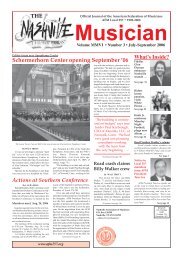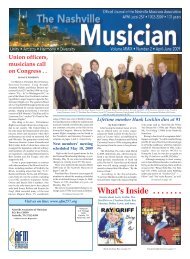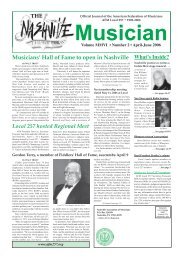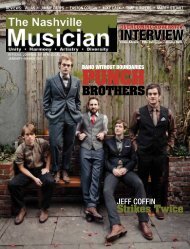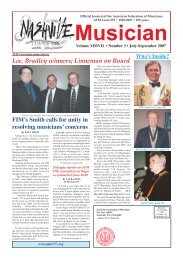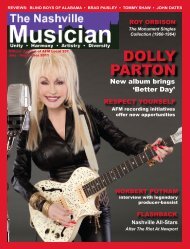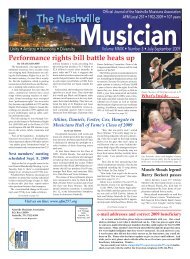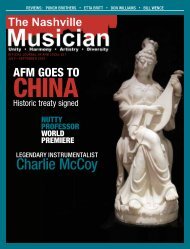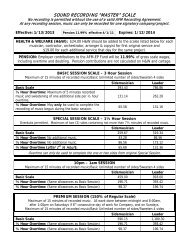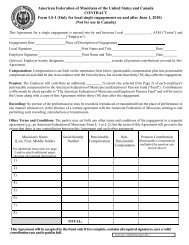Musicians Web pages - Nashville Musicians Association
Musicians Web pages - Nashville Musicians Association
Musicians Web pages - Nashville Musicians Association
- No tags were found...
Create successful ePaper yourself
Turn your PDF publications into a flip-book with our unique Google optimized e-Paper software.
18 The <strong>Nashville</strong> Musician October-December 2006<br />
One of <strong>Nashville</strong>’s first-call pickers has solo album<br />
Guitarist Bryan Sutton pays his homage to heroes<br />
By WALT TROTT<br />
Session musician Bryan Sutton runs on<br />
his own adrenalin.<br />
This high-octane picker, who in the studio<br />
has backed such high-profile performers<br />
as Dolly Parton, Trace Adkins and The<br />
Dixie Chicks, occasionally tours with the<br />
likes of Earl Scruggs, Hot Rize and Béla<br />
Fleck, and still finds time to release yet a<br />
third solo album “Not Too Far From the<br />
Tree” on Sugar Hill.<br />
“I had to come to the realization that as<br />
comfortable as it is to stay in <strong>Nashville</strong> and<br />
do sessions, I have to go entertain and play<br />
music for my sanity and to continue to grow<br />
as a player.”<br />
Sutton, reigning 2006 Academy of<br />
Country Music instrumentalist of the year,<br />
has also just been honored with multiple<br />
IBMA award nominations: Guitarist of the<br />
Year; Instrumental Album of the Year for<br />
“Not Too Far . . . ,” which includes a best<br />
producer nod; and for Best Recorded Event,<br />
thanks to bringing together his music heroes,<br />
such as dad Jerry Sutton, Doc Watson,<br />
Jerry Douglas, Tony Rice, Ricky Skaggs and<br />
Scruggs. Bryan was IBMA guitarist of the<br />
year in 2000, 2003, 2004 and 2005.<br />
Despite the acoustic guitar recognition,<br />
Sutton is also a pro on fiddle, banjo, mandolin<br />
and electric guitar His skill playing<br />
at high-speed got him dubbed “Bionic<br />
Bryan,” but when he does so, it’s never at<br />
the expense of clarity, tone or volume.<br />
“I’m not sure where that nickname came<br />
from, but I try to maintain the quality, no<br />
matter how uptempo the tune,” he insists.<br />
“I tell a lot of people, in workshops and<br />
classes or whatever sort of teaching environment<br />
I find myself in, that it’s mainly<br />
about the clarity and tone before speed. Generally,<br />
when you pick up speed, the volume<br />
tends to go down, but I try to do just the<br />
opposite . . .<br />
“As far as the actual technique of<br />
flatpicking goes in playing bluegrass guitar,<br />
obviously a lot of that stuff is really fast,<br />
but I would much rather hear somebody play<br />
clear and clean at a slower tempo, than try<br />
to play something fast and sloppy.”<br />
A third generation player, James<br />
Bryan Sutton was born Oct. 16, 1973 in<br />
Asheville, N.C., a city steeped in musical<br />
heritage, and raised in suburban Candler.<br />
“Jerry, my dad, is a great rhythm guitarist,<br />
but plays really good melodic banjo,<br />
and is a good bass player, who reads music.<br />
My grandfather Grover was an oldtime fiddler.<br />
Later in life, he got into building and<br />
fixing fiddles and trading fiddles back and<br />
forth. Anything to do with fiddles on any<br />
level, he was into. He played every day, and<br />
was a big fan of Jimmie Rodgers and the<br />
Delmore Brothers.<br />
“Being around Asheville when he was<br />
young, it was a hot spot for country music<br />
back then. You have the old-time bluegrass<br />
tradition there in the mountains. But<br />
Asheville was also a standard stop on the<br />
trail for the Carter Family and Rodgers and<br />
that kind of sound in those days.”<br />
Glen Duncan, equally adept on fiddle or violin.<br />
Bryan Sutton helped headline the 7th annual American Music Festival at the Ryman, Sept. 22.<br />
According to Bryan, WWMC-Asheville<br />
was a powerful country station to listen to:<br />
“Growing up there and not too far removed<br />
from them time-wise, a lot of the same musicians<br />
locally were still playing. I was of a<br />
different generation, but I got to hear and<br />
be around a lot of old-time musicians, who<br />
were hallowed and revered there.”<br />
Grampa Grover, who gifted 10-year-old<br />
Bryan with an Ibanez guitar, had a brother<br />
Hershel, who played harmonica. Bryan’s<br />
mother Carol played piano, mainly as pastime,<br />
while his older sister Leesa played<br />
fiddle.<br />
“And in my dad’s mother’s family there<br />
were some grand uncles back in the 1800s,<br />
of whom we have pictures with fiddles and<br />
banjos, things like that. It was such a rich<br />
area for music, kind of like Texas, where a<br />
lot of not necessarily professional musicians,<br />
but just active musicians on the scene,<br />
never felt the need to leave there as far as<br />
the enjoyment of playing was concerned.”<br />
Bryan recalls that through his childhood,<br />
his father and grandfather were in a group,<br />
the Harmony Valley Stringband: “My earliest<br />
memories were listening to them practicing,<br />
through the late 1970s and early ’80s.<br />
I would sit in my room with my little play<br />
guitar and strum along with them.”<br />
At 8, he started getting a chance to play<br />
for real when dad began providing music<br />
lessons on a Gibson L-00 that belonged to<br />
his granddad.<br />
“When we were kids, Leesa and I also<br />
played in a family band with my dad and<br />
another friend of ours. Leesa played all<br />
through her elementary and high school<br />
years, but didn’t have the same fire about it<br />
that I did. She quit playing in college, and<br />
since then doesn’t play anymore, though<br />
she’s really involved behind-the-scenes on<br />
a volunteer level handling planning and logistics<br />
for things like festivals and events.<br />
She actually has a job with the state in what<br />
they call the Office of Tourism & Cultural<br />
Heritage Development, some long title like<br />
that . . . Good for her.”<br />
“One thing about my mother, she made<br />
lots of sacrifices, driving us all over the<br />
place for lessons. I was taking guitar and<br />
banjo lessons at one point from different<br />
people on opposite sides of town. I studied<br />
classical guitar and jazz. I always felt like<br />
she and dad both were very supportive. I<br />
think they thought Leesa and I had a talent<br />
for music.”<br />
Bryan also would “jam” at different<br />
houses and places around Asheville: “It was<br />
a great way to meet other musicians and to<br />
learn about our area, and all the while I was<br />
learning to play better. I liked that because<br />
there was never any sort of pedagogue of you<br />
learn this song, you learn the scale and you<br />
apply certain theory . . . It was the basis of<br />
my learning and ear training, I guess.”<br />
In high school, Bryan even played in a<br />
rock and roll band.<br />
“It was a show choir backup band, with<br />
probably 15 girls in the group, a singerdancer<br />
ensemble thing, and we had two gui-<br />
Bryan goes over a number with vocalist Dolly Parton.<br />
tars, bass, drums and keyboards. I’d never<br />
played anything much involved with pop<br />
music and it was neat to have that opportunity.”<br />
He still regards Eddie Van Halen as<br />
a favorite guitarist.<br />
During school days, pianist Anthony<br />
Burger, one of the more renowned gospel<br />
players (and late member of Local 257),<br />
moved next door to the Suttons.<br />
“He performed with The Kingsmen, a<br />
Southern gospel quartet based out of the<br />
Asheville area. As a senior in high school I<br />
went to Anthony and told him I was interested<br />
in getting into the music business. I<br />
had a sense that being a sideman was what<br />
I wanted. When I would see bands on MTV<br />
or The <strong>Nashville</strong> Network I was more into<br />
what the guys in the background were playing,<br />
not the singer. I’d see the acoustic<br />
player in Eric Clapton’s band or some guy<br />
playing on the Grand Ole Opry, or different<br />
bluegrass players, and knew that was<br />
more what I wanted to do, as opposed to<br />
being an artist or such.<br />
“I also knew Anthony did a lot of session<br />
work with Southern gospel groups,”<br />
continues Sutton. “There was a studio that<br />
not only did The Kingsmen’s records, but<br />
had a stable of artists and different groups<br />
that came in to do custom records. So they<br />
were basically doing two or three records<br />
a week there. I’d go over after school, hang<br />
out and meet all the players.<br />
“There were about six or seven<br />
musicans who would get calls to do all<br />
these records. Luckily, some of the best musicians<br />
I ever heard were there including<br />
Tony Creasman, a drummer who a lot of<br />
guys here know about, and another named<br />
David Johnson. Primarily on Asheville sessions<br />
they used a drummer, bassist, pianist<br />
- and David. David worked sessions in<br />
Asheville, in East Tennessee, down towards<br />
Charlotte, and around Greenville,<br />
S.C., sort of in a 150-mile radius that was<br />
his to work.



